2017 Jan-Jun
To Sound Like (a) Russian Omit (the) Articles

By our reckoning German has an excess of articles: ein, eine, das, die, der, dem, etc. English gets by fine with three: a, an, the. But to a Russian speaker that might seem too many. That’s because Russian has no words for a or the. Which means you can have a perfectly coherent language without these articles. This is why Russians speaking English sometimes don’t include them, they just don’t come naturally. This quirk is used in lots of old jokes when Russians are speaking. As in…
Cosmonaut: In Russia we have world’s greatest space program. In one year we go to sun.
Astronaut: You can’t go to the sun, you’ll burn up.
Cosmonaut: This is not problem. We go at night.
Filed 6/27/17
See Run Run. Run, Run, Run.

It’s curious, to us at least, how one word can have so many completely different meanings and not be confusing when it crops up. On the other hand, we have the reverse case. That is, one meaning with multiple words. We have a term for that, synonym. What’s the term for the the other? We’re not entirely sure, but there is this:
homograph (hŏm′ ə-grăf, hōm′ ə-grăf) noun, a word of the same written form as another but of different meaning and usually origin, whether pronounced the same way or not, as bear “to carry; support” and bear “animal,” or lead “to conduct” and lead “metal.”
As you can see as in the word lead, a heteronym is a homograph, though not always the other way around. (You just knew we’d squeeze heteronym in here one way or another.) Then there is…
polysemy (pŏl′-ē sē-mē, pə-lĭs′ ə-mē) noun, a condition in which a single word, phrase, or concept has more than one meaning or connotation.
Think of the phrase, “all over.” Which could mean everywhere or totally finished.
English Words with the Most Multiple Meanings
Whether the words at the link qualify as homographs or not, we’re not entirely clear. Nor do we know what you call a word that can be pronounced more than one way. Though, considering accents and dialects, that might include half the dictionary.
Filed 6/20/17
On the Horns of a Dilemma
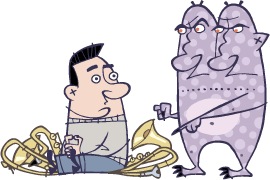
OK, we admit the visual pun, or whatever you’d call it, is an idea stolen from Mad magazine’s “Horrifying Clichés” bit. So sue us. Though it won’t do you any good because they didn’t originate the idea of literal depictions of figures of speech as a gag. That goes back to an Italian cartoon strip Bilbolbul begun by Attilio Mussino in 1909.
A dilemma is a choice between two equal options. Latin, from Greek dilēmma, DI- (double) plus lēmma, proposition. These might be equally good or bad options. Though for a pessimist equally good is equally bad since you are going to miss out on one good option no matter what. Vice-versa for an optimist.
Filed 6/9/17
It Seemed Like a Good Idea at the Time; Not

“The purpose of thinking is so our ideas can die instead of us.” –Karl Popper
Filed 6/7/17
Infrequently Answered Questions
Animals Just Ain’t Human
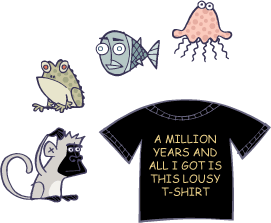
Q: What separates man from beast?
A: Tool use? Nah, some animals, chimps and birds for instance, fashion and use simple tools. Language? Many animals communicate with calls and such. Music and art? Well, songbirds sing and bower birds decorate their nests, or bowers actually.
Looking around we’d have to say what really separates man from beast is clothes. People wear clothes. Animals never do. Not if they can help it, that is. Sure, some people dress their pets, but that’s human doing not Mother Nature. Anyway, animals go around stark naked and aren’t embarrassed doing so. By their expressions, we get the idea dogs are embarrassed wearing clothes rather than not. Cats, by contrast, look positively pissed when dressed up.
Though one might say some animals kind-of dress up. Hermit crabs don abandoned mollusk shells. Which is more armor than clothes. Elephants cover themselves with dirt and pigs with mud. Not really clothes, though. A wolf in sheep’s clothing is only a saying not a real thing wolves do. Non-human mammals don’t wear clothes because, well, they grow their own. Fur. Or hair or wool in some cases. Except big, fat ones like hippos and whales who have nothing.
Now then, big, fat animals in clothes would look absurd. On the other hand, big, fat people without clothes… we don’t even want to think about it.
Filed 5/9/17
A Caboodle of Redundant Common Phrases

Kit and caboodle – A kit is a collection, like a tool kit. A caboodle, originally boodle, is a group. (Not that people commonly say either boodle or caboodle any more.) Collection, group, pretty much the same thing. If your kit or caboodle is mismatched or haphazard you might say it contains…
This and that – This and that are obviously not the same item, but in the phrase nobody differentiates what’s this and what’s that, they’re both whatever. A lot like…
Odds and Ends – Odds are unmatched items and ends are leftovers. They’re pretty darn close to the same things. Just like…
Bits and bobs – Lo and behold we have this and that odds and ends. Which leads us to…
Lo and behold – Lo means look. Behold means see it, or look at it. To say the phrase another way…
Look and see – This might not be all so redundant as see can also mean understand while look doesn’t. To which we say…
Fine and dandy – Perhaps dandy is a little better than fine, but they’re still rather the same sentiment. Our likely reaction when something is…
Fair and square – Fair deal, square deal, same thing. A square has four equal sides, what could be more fair? Much better than…
Rack and ruin – The rack isn’t like the torture device, but a variant of the now defunct word wrack, which became the modern word wreck everywhere except in this phrase. Unfortunately we’ve run out of segues to lead into the last two, but here they are anyway…
Hard and fast – The fast here isn’t speedy, but firmly affixed or sturdy. (Fast is the root of the word fasten.) In which case fast pretty much means the same as hard: firm, not easily broken or detached. The phrase originated as a nautical term meaning a ship was firmly beached or run aground.
Beck and call – Call means just what you’d think. Beck only exists now-a-days in the phrase so you wouldn’t know what to think, except it means call. Sort-of. Beck is a shortened form of beckon, which is to call with a gesture, a nod, a hand motion, a curling finger, that sort of thing.
So then, why do we have so many redundant phrases such as these? Quite simply as a rhetorical device, repetition adds emphasis. Even better when words rhyme, like fair and square; or are alliterative, like rack and ruin. While popular phrases come and go these go on and on. Even when the redundancy is as obvious as on and on.
Filed 5/3/17
May We Say, “Mai Oui, C’est Mai”


It’s another interactive cartoon. This time, a two-fer. Mouseover the pic for the second joke. Did we do it because we couldn’t decide on the gag line? Just what does the headline have to do with it? Is there some secret meaning to it all? Another unsolved mystery? You may never know.
Filed 5/1/17
Unsolved Mysteries as Not Seen on TV Not Narrated by Robert Stack
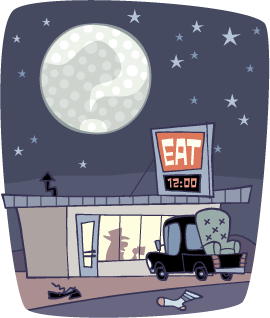
Truth is often stranger than fiction. Join us as we explore the unexplained, investigate the enigmatic, inspect the spooky, probe the peculiar, and mull over mysteries that remain unsolved, because solving them would mean they wouldn’t be mysteries.
In a small Nevada dessert town a man returns home to discover every LCD clock and appliance display in his home is flashing 12:00. There’s no sign of a break-in or intruder and all clocks and appliances are otherwise in perfect working order. The man resets all the clocks and appliances which have displayed the correct time unfailingly to this day. Was it some sort of elaborate scheme of an unknown practical joker, or something more sinister? We may never know.
A seemingly average American man driving down a well-travelled Cleveland thoroughfare sees a single shoe by the side of the road. Yet no sign of a man wearing only a single shoe is anywhere to be found. How did this mystery man loose a single shoe on the road only to disappear without a trace, just where was the other shoe? We may never know.
On a warm, humid summer night in Peoria a woman watches Seinfeld on TV with the inexplicable feeling she knows what every character will do and say before it happens, just as if she has seen and heard it all before down to the smallest detail. Was it just a case of déjà vu as some suggest, or was she somehow reliving an entire day of her life? We may never know.
A stranger arrives at an out of the way roadside diner in rural Montana, orders a cup of coffee and a donut. Without another word, he drinks his coffee, eats half his donut, pays his tab and leaves, never to be seen again. Who was this mysterious stranger, why didn’t he finish his donut, and why did he leave such a small tip? We may never know.
On a typical Spring afternoon a Nebraska woman is doing her laundry without a care in the world. As she sorts her socks she notices one is unmatched. She retraces her steps, checking the hamper, basket, washer and dryer to no avail, the sock has vanished without a trace. Whatever happened to the missing sock, and where did all that lint come from? We may never know.
In San Francisco’s Chinatown after finishing his restaurant meal a man breaks open an ordinary looking cookie and finds a message hidden inside. The cryptic message reads, “Nothing ventured, nothing gained.” The very next year this same man wins $10,000 playing the daily lottery. Was it mearly an uncanny coincidence or did the annonymous fortune somehow know he should buy a ticket a full year ahead of time? We may never know.
One morning before work a Chicago woman looks desperately for her missing car keys. In her favorite easy chair she finds thirty-seven cents in change and three kernels of popcorn, but no trace of the car keys at all. Whatever happened to the keys, where did the money come from, and who was eating popcorn in her favorite chair? Was there a link between these seemingly unrelated items? We may never know.
Filed 4/28/17
Hicksville, Luzon P.I.

We all know hillbillies live in the boonies. The word hillbillies is easy enough to understand, folks who live in the hills. Just why or exactly what are/is the boonies? Anything to do with Daniel Boone? Nah, Daniel Boone never lived in the boonies because they didn’t exist then. At least the word didn’t. Boonies comes from boondocks which was originally American military slang derived from Tagalog bundok, meaning mountain. This term came about during the Philippine-American War.
Another Asian term we get from the military, gung ho. In Mandarin that’s kung work, and ho together. The Anglicized term became widely known as a slogan adopted in WWII by the United States Marines under General Evans Carlson. How exactly “work together” came to mean zealous is not clear to us.
A third Asian word that’s entered English, not by way of the military, is ketchup, or catsup. From the Cantonese kezap; the Z is pronounced like TS. Just like the Germans do it. Which must mean when the Chinese write Chinese words with Roman letters they spell like Germans or something. We don’t know.
Filed 4/27/17
Overstuffed with… Uh… Stuff

blivy [or blivey] (blĭv′-ē) noun. Ten pounds of manure in a five pound bag.
That word and definition courtesy of my dad, only he didn’t use the word ‘manure’ rather employing a vulgarism which sounds a lot like ship. When presented with a blivy of my doing he would say along similar scatological lines, “Son, you couldn’t even crap in your own pants.” Only he didn’t use the word ‘crap.’ Instead he used the same vulgarism from above as a verb. Whether I could produce a blivy in my own pants he never ventured an opinion. While a blivy is bad enough and to be avoided if at all possible, a burning blivy… well, you can imagine.
Filed 4/24/17
Possessing Ideas
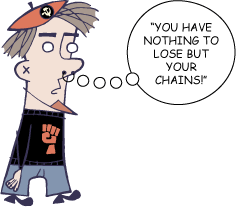
“People don’t have ideas. Ideas have people.” –Carl Jung
Think of an ideology. Then think of a true believer. Need we say more?
Filed 4/20/17
Mathematical Proof You Are Impossible

Unless you’re a clone you have a mother and a father. And your parents each had a mother and a father. So, you have two parents, four grandparents, eight great-grandparents, sixteen great-great-grandparents. We could go on but it starts getting confusing adding all those greats for each generation you go back.
If you go back ten generations, that’s about three hundred years or so, you’ll have one thousand twenty-four great(x7) grandparents. So then, how many great(x30) grandparents do you have if you go back that far? Pause to imagine… Eight billion, five hundred eighty-nine million, nine hundred thirty-four thousand, five hundred and ninety-two. (8,589,934,592)
We’re talking about the year 1000AD roughly. You have more great(x30) grandparents than people existed on Earth at the time. Without all those billions of ancestors having children having children having children and so on you wouldn’t have been born. The arithmetic says most of your ancestors are missing. Therefore, you are impossible. And the further back you go the less possible you get.
Filed 4/14/17
Another Movie Poster Via the Wayback Machine
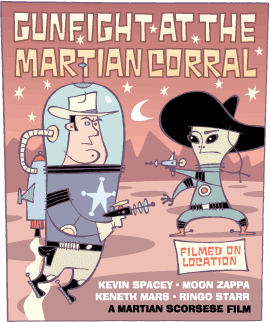
Another old art spot from Fortean Times of 1997, an imaginary poster for an imaginary film that’s a combination horse and space opera. Though why opera when nobody sings in them? Who knows?
And don’t ask what this art spot was about, it ran twenty years ago. Also, don’t ask me how the moon got out to Mars. Nor why the alien is wearing a sombrero. These are questions I have no ready answer for. That’s just the way science fiction is. You start to question things and you get sidetracked into ideas that don’t really matter.
Like, why do you need to swing a light saber? Couldn’t you just point it and turn it on for a thrust at the speed of light? And couldn’t a light saber be 100 feet long? After all, being made of light it wouldn’t weigh much, would it? With a 100 foot saber you could wipe out an entire platoon with a single swing. Maybe. All the same, with a straight blade and no hand guard, it’s more like a really long, glowing switchblade.
To ponder more sci-fi imponderables, when people transport in Star Trek, are the disassembled bits temporarily dead during transport and brought back to life upon reconstitution? Could you store transporter reassembly information and transport yourself younger? In other words, revert to saved?
Despite our questions, sci-fi still makes more sense than opera. After all, who going through the trials and tribulations of life suddenly bursts out into song about it?
Filed 3/25/17
Poster for the Movie You’ve Never Seen Though You Have
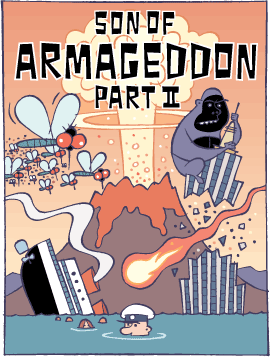
Doesn’t it seem like every movie is a remake? Or a sequel. Or a retelling of the same old story in a different time and place. Or, as in the case of the art you see, a rerun. From Fortean Times of 1997.
In a way, every story is a disaster story of sorts. Sometimes a small disaster looms, other times the end of the world as we know it is in the cards unless the protagonist averts it. If it’s a comedy they succeed. Which is the oldest meaning of comedy, a happy ending. If they fail it’s a tragedy. One or the other. That’s what the old Greek comedy and tragedy masks for the theater are all about.
Anyway, if there were no trouble brewing there’s really not much of a story to engage people. Why bother watching things happen that make no difference one way or another? So, while they say there are only seven basic plots, (or whatever the number is) maybe there’s really only one. Disaster looms and they escape or they don’t. Fin.
Filed 3/21/17
More Wordplay Words

Humor is a funny thing. That’s some pretty silly wordplay, but I have to start somewhere. Yet it illustrates how switching between a literal and figurative meaning can be (possibly) amusing. You think it says one thing, but it says another instead. That’s how a syllepsis works. Or you might switch between a noun and verb meaning of a word. But enough of dubious dissection, let’s get to it.
aptronym: A name that is perfectly suited to its owner.
Here’s a real one from my hometown, an optometrist by the name of Ivan Doctor. That’s right, Dr. I. Doctor, eye doctor.
paraprosdokian: A sentence or phrase that ends in an unexpected way.
Pretty much a oneliner. For instance, “Hospitality is making your guests feel at home, even when you wish they were.” Or, “As cooks go she can’t.”
Tom Swifty: A made-up quote followed by an adverbial pun.
“I think the lobotomy went well,” said Bob absentmindedly. “Oops. I just stabbed myself,” Jim said pointedly. That’s all there is, he wrote finally.
Filed 3/8/17
Ten Things Explained with One Venn Diagram




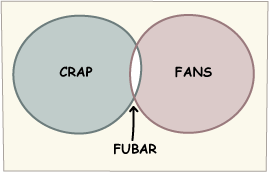

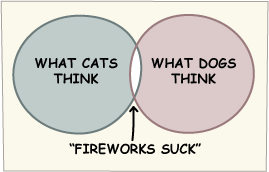
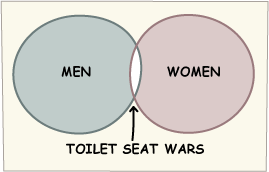
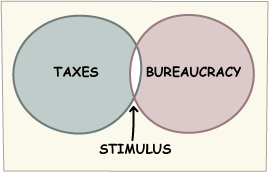
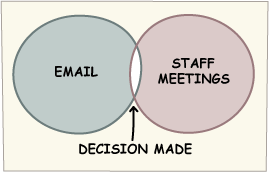
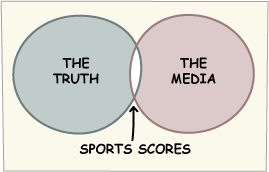
Mouseover number for each diagram
Filed 2/22/17
How to Fake It Like a Pro

Another old spot from the archives for which the manuscript is long gone. So I’ll just have to fake it. It’s a joke. Get it? OK, not much of a joke, but I need an intro to get to the point at hand. Which is an old joke I never really understood until I began studying piano. Here goes, in a pared down version.
Two jazz musicians are walking along a pier. One falls over the edge into the water and cries out, “Help! I don’t know how to swim!” The other musician yells back, “Fake it.”
This joke really only works if you know musician lingo. What they mean by fake it. This is when you’re in a jam session and you don’t know the tune you can still play along by faking it. This doesn’t mean pretending to play, like a Hollywood actor moving his hands over the keys not actually playing anything. It means you pick out the tempo, key, and chord progression and play along with whatever you can manage that fits. Going through the tune you learn the melody and bridges at whatnot and can then play those, too. Well, if you’re any good you can, which leaves me out. Of course, it helps than most jazz, blues, rock and pop music have pretty much the same basic and fairly simple structure.
Anyway, this term, fake, also lends itself to what they call a fake book. This is not an imaginary book, but sheet music written with a shorthand musical notation system. You are likely familiar with classical music notation, those five line staffs with all the notes, clefs, rests, sharps, flats and what-have-you. These leave nothing to chance, every note (quaver) played is jotted down. Usually. Sometimes you can toss in your own flourishes, but mostly everything is there.
A fake book is different. All you have is a barebones melody line and shorthand key signatures through the progression, or changes as they say. So, instead of putting down all the sharps and flats and the notes that make the chord they’ll just put down something like F-7 (F minor seventh). The player knows what notes are played in that scale and how to play some version of the chord. Same goes for the melody line, you can fill in notes around it, mostly under, as long as you hit the melody line on the right beats. In simplistic terms the key signature tells you the bottom note, the melody line tells you the top note and you make up everything in between with whatever works in the scale.
So then, for any non-musician readers who have heard that old joke and didn’t really get it, as I didn’t for many years, now you know.
Filed 2/17/17
Sciency Fiction News
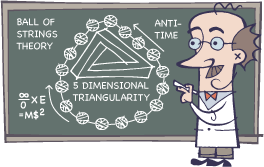
We excerpt an amusing short review by William M. Briggs on what looks to be a funny new Science Fiction novel, A Theory of Nothing by Thomas Barlow. While we try to poke fun at some of the nonsense in Sci-fi and the way science is too often done in the real world, this book seems to have skewered both in a way we can only envy.
The working of this beastie conjured the theoretical negatronium particle, which was duly searched for and discovered. Thinking on this led Barlow to have Karlof say, “It is one of the extraordinary attributes of modern theories that their theories often prove malleable enough to conform to almost any fact.”
This allows Barlow to have a wise old man to tell Karlof, “Long ago, we invented the first truly effective way to disconnect Americans from reality. It’s called the national debt… What we’ve shown, through the practical application of simple economic principles, is that if Americans cannot have free energy, they can at least have free money. Public debt is our equivalent of a perpetual motion machine.”
A Theory of Nothing Leads to Something
(Good joke in the comments, too.)
Filed 2/10/17
Seeing Patterns Everywhere

pareidolia (per-ī dō′-lē-ə) noun. The tendency to perceive a specific, often meaningful image in a random or ambiguous visual pattern. The human ability to see shapes or make pictures out of randomness.
Can you say Rorschach inkblot test? How about the Big Dipper? How about bunny rabbit cloud or potato chip that looks like Nixon? How about ;-) ?
apophenia (a-pə fē′-nē-ə) noun. The tendency to perceive a connection or meaningful pattern between unrelated or random things (such as objects or ideas).
Can you say superstition or astrology? How about vast conspiracy? How about, “With a capital T, which rhymes with P, and that stands for pool”?
Both of the above human tendencies are the outcome of the way people naturally make sense of and deal with the world, pattern recognition and categorization. When one thing is like another we can understand a new thing more quickly and easily without having to examine it starting from scratch, so to speak. At least that’s the pattern we see. Hm-m-m…
Filed 2/5/17
Happy Woodchuck Day,
or Subterranean Homesick Blues

Woodchuck, groundhog, same thing. But we already did that. The question on everyone’s mind, will the woodchuck come out of its burrow and chuck some wood? The second question, how much wood would the… forget it, we already did that one, too.
This year, instead of rousting some poor groundhog from its slumber to see if it sees its shadow, let’s sing Bob Dylan’s woodchuck song. Don’t know it? Sure you do.
How much wood would a woodchuck chuck,
If a woodchuck could chuck wood?
The answer, my friend, is blowin’ in the wind.
The answer is blowin’ in the wind.
Filed 2/2/17
Germans –Like Yoda They Speak

“You can’t interrupt a German because you don’t know what he’s saying since the verb at the end of the sentence comes.”–attributed to Mark Twain
A funny line if you know the basics of German syntax. Which is actually explained in the joke. Now that we’ve established the verb at the end of the sentence business, perhaps this next gag will raise a smile. “I once read an entire book in German but didn’t know what was happening until I got to the verbs on the last page.”
Clearly not enamored with Der Father Tongue, Mark Twain’s A Tramp Abroad has a section called “That Awful German Language.” Here’s more Twain on German.
A dog is “der Hund”; a woman is “die Frau”; a horse is “das Pferd”; now you put that dog in the genitive case, and is he the same dog he was before? No, sir; he is “des Hundes”; put him in the dative case and what is he? Why, he is “dem Hund.” Now you snatch him into the accusative case and how is it with him? Why, he is “den Hunden.” But suppose he happens to be twins and you have to pluralize him– what then? Why, they’ll swat that twin dog around through the 4 cases until he’ll think he’s an entire international dog-show all in is own person. I don’t like dogs, but I wouldn’t treat a dog like that– I wouldn’t even treat a borrowed dog that way. Well, it’s just the same with a cat. They start her in at the nominative singular in good health and fair to look upon, and they sweat her through all the 4 cases and the 16 the’s and when she limps out through the accusative plural you wouldn’t recognize her for the same being. Yes, sir, once the German language gets hold of a cat, it’s goodbye cat. That’s about the amount of it.
About the German Language –Mark Twain quotes
Filed 1/22/17
1.21 Gigawatts Is Child’s Play for Mother Nature

Lightning is much more powerful than long suspected. Unlike in Back to the Future with its Professor Brown shocking 1.21 gigawatts, strong lightning bolts can be in terawatts. A terawatt is 1,000 gigawatts. A gigawatt is 1,000 megawatts and a megawatt is 1,000 watts. And you thought a 150 watt lightbulb was bright?
Odd how a watt is named after James Watt who built the improved steam engine and not any kind of electrical gizmo. Though technically a watt is a measure of power, how much work an electric current can do. One watt is equal to one joule per second, if that means anything to you. We would explain it, but, since we don’t actually understand it, we won’t. Make that can’t.
Of course, Mother Nature really rolls up her sleeves and goes to work out in space. The sun is 3.9x10^26 watts, or if you can’t make sense of exponents 390,000,000,000,000,000,000,000,000 watts. Though a number with that many zeros is hard to relate to as you never count anything in your everyday life that high. After all, nobody takes inventory by molecule count, do they?
Filed 1/2/17